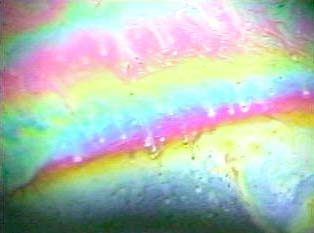Soap Film Interference
The interference colors from a soap film can be related to the thickness of the film by using the interference condition and noting that there is a 180 degree phase change upon reflection from the film surface, but no phase change for the reflection from the back surface. The color seen depends also upon the angle of view.

This is an exploratory calculation which will calculate the wavelengths for maximum reflection and transmission, the thickness of the film, or the angle of incidence. Enter the needed data and then click on the rectangle for the desired quantity in the active graphic above.
Notes: The range of parameters which gives reflected or transmitted light in the visible range (roughly 400 to 700 nm) is very limited. If no parameters are entered, their values will default to incidence at 30°, n=1.42, and reflection in the green at 550 nm. All parameters may be changed, but calculated wavelengths outside the visible may not be at all reliable since the values usually given for indices of refraction are for the visible range only. If you see a visible color reflected from a soap film, you can get an approximate wavelength from a diagram of spectral colors, but there is no simple way to determine what order of reflection you are seeing.

 | Large soap bubbles can be produced from a solution of dishwashing detergent and glycerine. Experimenting with mixtures can produce solutions that will make long-lasting bubbles. In these examples it is not evident what order of interference is being seen, but the colors range through the entire visible spectrum. |

| Reflection and interference from a soap filmThese fringes were recorded with a camcorder. The soap film was formed by dipping a loop formed by thumb and forefinger into a concentrated solution of dishwashing detergent. Note that you see red at three different angles, showing that three orders of reflection have been spanned. Bands of color can also be seen if the film thickness is varying. Image courtesy of Brian Dalton. |
| Thin films | Snell's law | Surface tension |
Interference concepts
Reflection concepts
| HyperPhysics***** Light and Vision | R Nave |